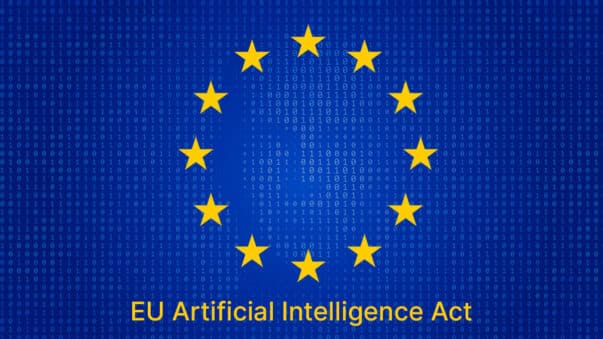What the EU AI Act Means for Your Business?
The EU AI Act came into force on 1st August 2024, but what will its impact be on businesses.

The EU AI Act, the world’s first piece of legislation regulating the deployment and use of artificial intelligence, officially entered into force on August 1st 2024. While companies won’t be subject to the act straightaway, it’s vital that all organisations are aware of how they will be affected, as the Act will be enforced gradually with most parts of the legislation applicable within 12 months.
What is the EU AI Act?
The Act is a ground-breaking piece of legislation that will have significant implications for businesses using AI within Europe. The aim of the Act is to regulate the use of AI in order to protect health, safety, human rights and the environment.
The approach taken categorises AI systems based on level of risk, ranging from minimal to unacceptable. Depending on the risk category, businesses will face varying compliance requirements.
Five risk categories
Prohibited AI practices – AI practices designated as particularly harmful, such as those that exploit people’s vulnerabilities. These will come into force in the next six months.
High-risk AI systems – High risk systems that include biometrics and the use of AI in infrastructure such as public services, education, employment and law. For these, the Act requires risk management systems to be set up with human oversight.
General purpose AI models – Documentation and instructions on safe use must be provided. These requirements will become applicable within 12 months.
AI systems requiring transparency – Providers must ensure that people are aware that they are interacting with AI. Artificially generated content must be disclosed.
Low-risk AI systems – Voluntary codes of conduct will be set up for low-risk systems.
The EU AI Act will also contain measures to support AI start-ups with regulatory sandboxes. Fines and sanctions will be available to EU member states for enforcement with the most serious punishable with fines of up to €35 million or 7% of the company’s annual global turnover for the preceding year.
Who is affected and what do do now
The legislation will affect some organisations more than others, particularly those working within health, finance, autonomous systems such as self-drive cars, and law enforcement. Organisations that will be impacted include:
- Those with, or placing, AI systems on the EU market, including importers and distributors.
- Companies deploying AI systems within the EU.
- Businesses that create output using AI within the EU.
- Manufacturers that include an AI component with their product.
The EU AI Act has far-reaching implications for all types of organisations using AI. Companies should act now and conduct a full audit of their operations, classifying AI use based on risk level, before developing robust compliance frameworks. To avoid falling foul of the legislation, companies should establish data governance measures ensuring transparency and human oversight, while also creating detailed documentation on AI use. By doing so, companies can mitigate risk, and enhance their reputation.
To find out more about how DigitalWell helps businesses meet their compliance obligations, talk to a representative.


